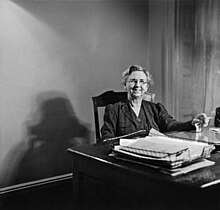Caroline Pratt (educator)
| Caroline Pratt | |
|---|---|

Caroline Pratt at her desk. Photographer and date unknown, perhaps mid-1920s.
|
|
| Born |
May 13, 1867 Fayetteville, New York, New York |
| Died | June 6, 1954 (aged 87) New York, New York, USA |
| Education | Teachers College, Columbia University, Bachelor of Pedagogy, 1892–1894 |
| Occupation | founder, City and Country School; educator |
| Parent(s) | Henry Pratt Lydia (Rowley) Pratt |
| Relatives | Elizabeth Sophia (sister), John Davis (brother), Henry Rowley (brother), Helen Marot (companion) |
Caroline Pratt (May 13, 1867 – June 6, 1954 ) was an American social thinker and progressive educational reformer whose ideas were influential in educational reform, policy, and practice.
Pratt is known as the founder of City and Country School in the Greenwich Village section of the borough of Manhattan in New York City; the inventor of unit blocks; and as the author of I Learn from Children (HarperCollins, 1948; rereleased in 1990; republished by Grove Atlantic in May 2014), an autobiographical account of her life and educational experiments, philosophies and practices. Pratt's specific style of progressive education, focused on first-hand experiences, open-ended materials, and social studies, has been cited and described by figures as noted as John Dewey and the architect and playground designer David Rockwell. Her original vision endures at City and Country School, which she founded in 1914 in the Greenwich Village section of New York City.
Pratt was born in Fayetteville, New York, on May 13, 1867. Her formal primary education was conventional, but her experiences of active, independent play with friends in Fayetteville’s rural setting were to be more influential in her work. .
After graduating high school on June 24, 1886, she spent a year caring for her sick father at home. In the fall of 1887 she was asked to accept a position teaching first grade in the village school. She held this job until the fall semester of 1892, at which point she moved to New York City and enrolled in Teachers College. Although she began by studying kindergarten, she turned her attention toward earning a certificate from the Manual Training Shop, eventually earning a bachelor of pedagogy and a position teaching manual training to future teachers at the Philadelphia Normal School in 1894.
Pratt joined the Philadelphia Normal School for Girls only six months before its manual training program’s inception. She was a special instructor in woodworking, training teachers to be proficient in skills such as gauging, squaring, sawing, chiseling, planning and boring, doweling, and chamfering. Pratt’s understanding of the relationship between hands-on learning and other subjects in a school’s curriculum would be evident throughout her career.
...
Wikipedia
